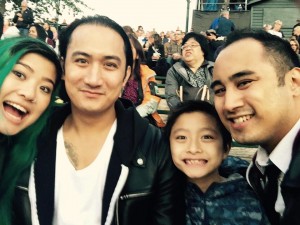First stories tell us how the world was created. In The Truth about Stories, King tells us two creation stories; one about how Charm falls from the sky pregnant with twins and creates the world out of a bit of mud with the help of all the water animals, and another about God creating heaven and earth with his words, and then Adam and Eve and the Garden. King provides us with a neat analysis of how each story reflects a distinct worldview. “The Earth Diver” story reflects a world created through collaboration, the “Genesis” story reflects a world created through a single will and an imposed hierarchical order of things: God, man, animals, plants. The differences all seem to come down to co-operation or competition — a nice clean-cut satisfying dichotomy. However, a choice must be made: you can only believe ONE of the stories is the true story of creation – right? That’s the thing about creation stories; only one can be sacred and the others are just stories. Strangely, this analysis reflects the kind of binary thinking that Chamberlin, and so many others, including King himself, would caution us to stop and examine. So, why does King create dichotomies for us to examine these two creation stories? Why does he emphasize the believability of one story over the other — as he says, he purposefully tells us the “Genesis” story with an authoritative voice, and “The Earth Diver” story with a storyteller’s voice. Why does King give us this analysis that depends on pairing up oppositions into a tidy row of dichotomies? What is he trying to show us?
———
I think what King is trying to do with the two creation stories he shares in The Truth about Stories, is divulge how despite his acknowledgment of the difference in creation stories, ultimately, there is still one that must prevail over the other. In this regard, it is as though he sets up this row of dichotomies for the purpose of showing his readers that while we are meant to exercise our subjectivity to choosing what we we want to believe, we are engrained to believe one story more than the other. There is an inevitability in having to establish one story as ‘more right’ than the other; it is merely unavoidable. In telling us the “Genesis” story in an authoritative voice, it is as though King implies that despite “The Earth Diver” story’s captivating, storyteller’s voice, it holds no place in comparison to the biblical creation story. I interpreted this dichotomy as King acknowledging the beauty and co-operation in the Native creation story, yet cautioning us that, especially to the Western world, it is as though individuals are more inclined to accept the Christian story, for “we are necessarily blind to the world that Charm and the Twins and the animals help create” (25).
I also found King‘s notion that one story must be sacred while the others remain just stories to be quite interesting as well, because as Dr. Paterson has noted, this sort of strict dichotomy is ironically exactly what Chamberlain and King himself have been arguing against; the fact that King presents us with two creation stories yet states that the “Genesis” story is told in an authoritative matter discredits the degree of choice he wants us to exercise in the first place. Just as Chamberlain cautions his readers against focusing on the binaries of reality and imagination, or real and make believe, King’s emphasis of the fact that “if we believe one story to be sacred, we must see the other as secular” (25) is quite perplexing, and throws off all that we have been taught so far.
However, the way I interpreted King’s examination, is that while we are capable of exercising a sort of subjective control in what we want to believe or not believe, the element of rank is always present. This goes with everything – despite claiming that things are of equal importance, rank, truth, desirability, etc. when it comes down to it, I believe that things are always put into a sort of hierarchal order, be it explicitly or implicitly; intentionally or unintentionally. Despite our best efforts to remain neutral and to acknowledge the accuracy and degree of truth in both Christian and Native stories respectively, we will inevitably be influenced to believe that there is one universal creation story that reigns supreme above any others; in this case, King suggests that it is the authoritative “Genesis” story. With this in mind, King essentially tries to show us that while there can be two creation stories and two different conceptions of a single truth, one always prevails over the others when put into a hierarchical order.
Works Cited
Kennedy, Paul. “The 2003 CBC Massey Lectures, “The Truth about Stories: A Native Narrative.” cbc. CBC, 7 November 2003. Web. 19 February 2016.
King, Thomas. The Truth About Stories: A Native Narrative. Peterbough:Anansi Press. 2003. Print.



